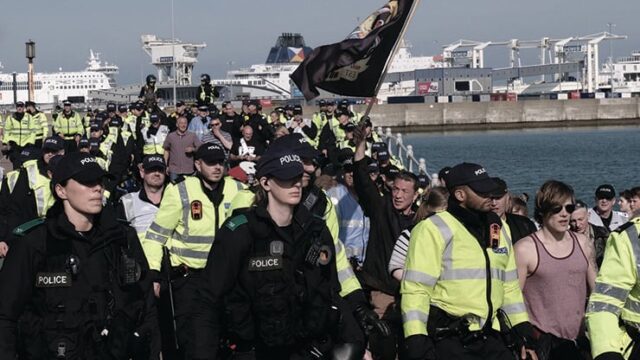Turbulent Times

In Gordon Bowker’s 2003 biography of George Orwell, we read of Orwell’s investigations among the Depression-stricken coal miners of 1930s northern England:
He remained at the tripe shop for almost two weeks, during which he attended large gatherings of “sheeplike” miners, concluding, “There is no turbulence left in England.”
A student of history might respond with, “Be careful what you wish for.” Indeed, turbulence can have unhappy consequences. Yet it seems that the English are recovering some of that turbulence whose loss Orwell bemoaned 89 years ago.
There was spot of vigorous turbulence in July and August last year: nationwide riots following the stabbing deaths of three little girls in Southport, northwest England.
Rioters assumed that the stabber, a 17-year-old black boy, was an immigrant. In fact, he was born in Wales to parents from Rwanda.
There is worse to come, says David Betz, Professor of War Studies at King’s College London. The good professor attained fame on the Internet in early 2025 with his predictions of a civil war in Britain. In a much-viewed interview on YouTube in March, he told the host that “things are going to come to a head within five years.”
This is not the idle opinion of a random citizen: Betz, born 1969, has been studying irregular warfare, including civil wars, all his professional life. In 2023, he wrote an article titled “Civil War Comes to the West” in Military Strategy Magazine, saying that
the major threat to the security and prosperity of the West today emanates from its own dire social instability, structural and economic decline, cultural dessication and, in my view, elite pusillanimity.
Betz says the coming British civil war will pitch globalist metropolitan elites and immigrants against working- or middle-class legacy-British nationalists, mainly from the provinces and the countryside. In short: snobs versus slobs.
The mighty surge of votes for Nigel Farage’s milquetoast-nationalist Reform Party in England’s May 1 local elections came from slobs. The snobs voted for globalists: for the Labour-Conservative uniparty and the fringe Liberal-Democrats and Greens. Projecting the votes to a general-election contest still suggests a 70-to-30 victory for snobs over slobs; the slobs won here because turnout was low and local issues dominated.
So: turbulence ahead. What precise form will it take? I hesitate to guess, and I have an excellent excuse for my hesitation. To people trained in mathematics, the word “turbulence” carries an extra load of negativity. I took my undergraduate degree in math at University College London in the mid-1960s. English universities back then—and perhaps still today, I don’t know—had no truck with Yankee nonsense about majors and minors: my course was three straight years of unadulterated math, math, and math. (The catchphrase at the time was that an English university education was narrow but deep, while an American one was shallow but wide.)
For the first two of those years, we all studied the same syllabus. In the third year, however, we were allowed to choose from a menu of courses in mathematical specialties that took our fancy. One of my choices was fluid dynamics. I had no particular interest in the subject per se, but had heard that it was an easy pass because there was only one equation to memorize.
The point of fluid dynamics is to describe mathematically the motions of fluids: gases, liquids, or assemblages of finely particulated matter like vapors, smoke, dust, or sand. There is indeed only one equation to memorize: the Navier-Stokes equation, which is the fruit of 19th-century efforts to apply Newton’s laws of motion to fluids. Unfortunately, the Navier-Stokes equation, while useful over a wide range of problems, has resisted efforts to find a general solution. As science historian James Gleick wrote, “Analyzing the behavior of a nonlinear equation like the Navier-Stokes Equation is like walking through a maze whose walls rearrange themselves with each step you take.”
A key consequence for physics is our inability to establish a general theory of turbulence, which would be mighty useful in fields from aircraft design to flood control, from meteorology to hematology.
In my college days, when public smoking was commonplace, we were introduced to turbulence with the example of a cigarette held stationary in still air. The smoke would go up vertically … for a while. Then there would be a short transition zone where the verticality wavered until, above that, it was altogether lost in a chaos of forks and curlicues—a turbulence that defied mathematical analysis.
There is a much-quoted story about the great 20th-century Nobel Prize-winning physicist Werner Heisenberg, who had struggled for years with the problem but had little success. On his deathbed, goes the story, Heisenberg declared: “I shall have two questions for God: ‘Why relativity?’ and ‘Why turbulence?’ I really think he may have an answer to the first question.”
Perhaps general theories explaining turbulence, in social sciences as in physics, are beyond our cognitive powers—although surely not, as Heisenberg suggested, beyond the Deity’s. We may now be in that transition zone below the forks and curlicues. Unless AI can come to the rescue, we’ll just have to ride them out.
